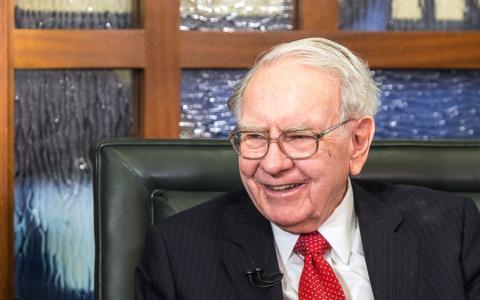
(Barchart) - Billionaire investor Warren Buffett, known for his strategic acumen, isn't your typical Billionaire. Potentially following in the philanthropic ideologies of historical Steel baron Andrew Carnegie, famous for his vicious business tactics and profound philanthropy, Buffett has long held he will give away an overwhelming amount of his wealth.
Most notably, he told Fortune in 1986 that he would provide his children “enough money so that they would feel they could do anything, but not so much that they could do nothing.” Over three decades later, the 94-year-old Oracle of Omaha remains committed to this principle. Despite his immense wealth of $145 billion, Buffett’s children will not inherit a significant portion for personal use. Instead, they will play a critical role in managing the distribution of his wealth to various charitable causes after his passing.
A Legacy of Giving
In 2006, Buffett stunned the world by announcing his plan to donate 85% of his Berkshire Hathaway Inc. (BRK.A)(BRK.B) shares to philanthropic organizations, with the majority going to the Bill and Melinda Gates Foundation. His commitment deepened in 2010 when he co-founded the Giving Pledge, a movement encouraging billionaires to dedicate the majority of their wealth to philanthropy. In his pledge letter, Buffett reiterated that over 99% of his fortune would be allocated to charity during and after his lifetime, a decision reflecting his philosophy on wealth and responsibility.
Buffett's three children—Howard, Peter, and Susan—may not be receiving a traditional inheritance, but they are not excluded from his estate plans. Each has been entrusted with managing substantial charitable foundations of their own, where part of Buffett's fortune will be directed, continuing his legacy of giving and enabling them to make a positive impact.
Buffett's Children and Their Philanthropic Roles
Buffett’s eldest son, Howard, is poised to become the non-executive chairman of Berkshire Hathaway after his father’s passing, a role emphasizing oversight rather than daily operations. Howard supports his father’s vision, understanding the importance of distributing the family wealth through philanthropy rather than bequeathing it all. “I can tell you, we'll sit down in a room when the time comes, and we'll get it figured out pretty quickly,” Howard remarked, highlighting the siblings' shared commitment to fulfilling their father’s wishes.
Howard, a farmer by trade, runs the Howard G. Buffett Foundation, focusing on food security and conflict resolution. The organization has supported various international initiatives, including collaborations with Catholic Relief Services to aid Central American farmers.
Susan Buffett leads the Sherwood Foundation, which channels resources towards early childhood education and social justice initiatives. Additionally, she is involved with the Susan Thompson Buffett Foundation, named after her late mother, which has donated billions to reproductive health causes, including organizations like Planned Parenthood.
Peter Buffett, alongside his wife Jennifer, operates the NoVo Foundation. Their philanthropic efforts center on empowering girls and supporting Native American communities, among other social causes. Peter's foundation emphasizes grants that promote social-emotional education and initiatives that drive systemic change.
Continuing the Legacy Through the Gates Foundation
A significant portion of Buffett's wealth has been funneled into the Bill and Melinda Gates Foundation. Since 2006, he has donated over $40 billion to the organization, contributing to global health, poverty alleviation, and education. While Buffett initially intended for his support to continue posthumously, he later revised his plan, confirming that his pledges would cease upon his death. This adjustment followed his departure from the Gates Foundation’s board in 2021, coinciding with the public announcement of Bill and Melinda Gates’ divorce.
“There’s eight billion people in the world, and me and my kids, we've been the luckiest 100th of one percent or something," Buffett remarked. "There's lots of ways to help people." His decision underscores his belief in impactful giving that transcends familial boundaries, favoring causes that address broader social challenges.
A Thoughtful Approach to Wealth and Values
Buffett’s approach to estate planning reflects his broader philosophy on wealth: it is a tool for good, not just a means to enrich oneself or one’s heirs. By designating his children as stewards of his charitable legacy rather than beneficiaries of his fortune, he ensures that his values are passed down alongside his wealth.
Jonathan Shenkman, President of Shenkman Wealth Management, commented, “Financial and estate planning is not only about the transmission of wealth, but also about the transmission of values to the next generation.” Buffett’s strategy exemplifies this principle, entrusting his children with the responsibility to use their influence and resources to drive change.
A Lasting Impact
According to IBT, Buffett’s children will have a decade after his passing to fulfill his wishes by donating his wealth to charitable causes, a task they acknowledge will be challenging but meaningful. Through their respective foundations, they have already been managing significant philanthropic efforts, collectively giving away over $15 billion since the mid-2000s.
Warren Buffett's decision to entrust his children with this monumental responsibility rather than traditional wealth inheritance is a testament to his belief in purpose-driven philanthropy. As they carry on his legacy, Howard, Peter, and Susan will continue to embody their father’s vision, proving that a fortune can be both a family legacy and a powerful force for good in the world.
By Caleb Naysmith
October 24, 2024



